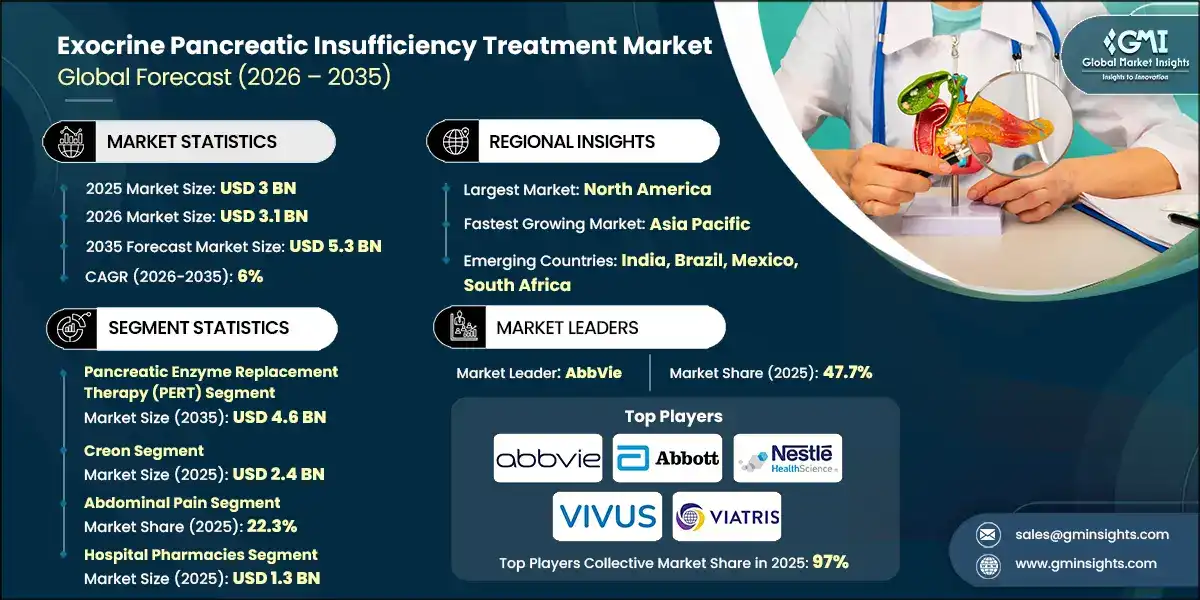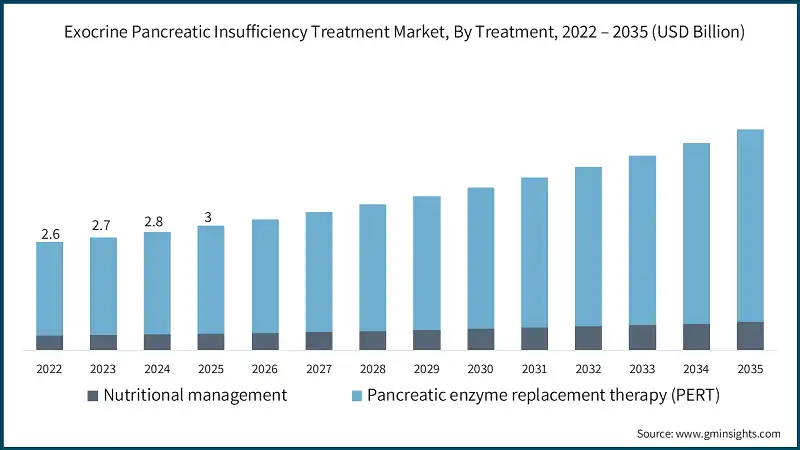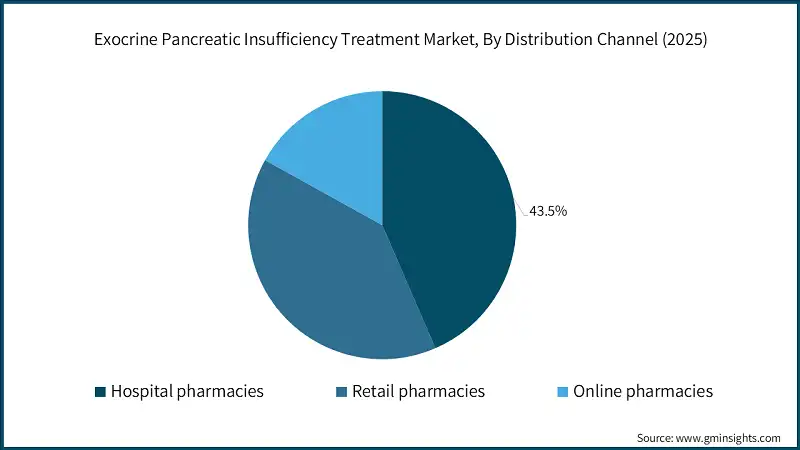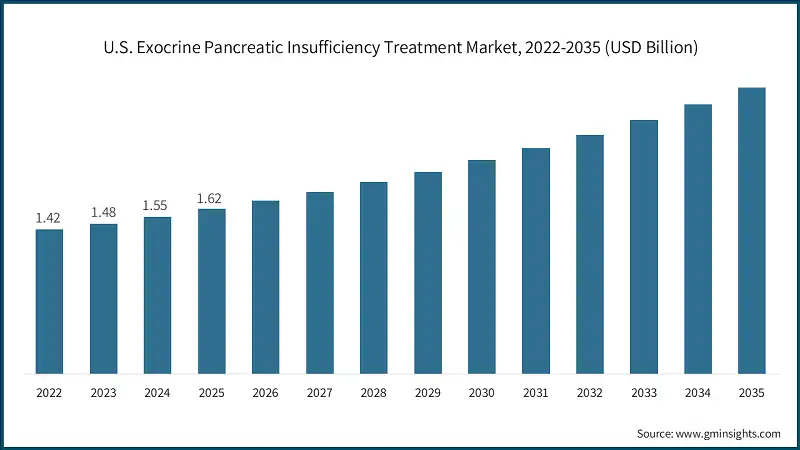Summary
Table of Content

Exocrine Pancreatic Insufficiency Treatment Market
Get a free sample of this report
Form submitted successfully!
Error submitting form. Please try again.
Thank you!
Your inquiry has been received. Our team will reach out to you with the required details via email. To ensure that you don't miss their response, kindly remember to check your spam folder as well!

Request Sectional Data
Thank you!
Your inquiry has been received. Our team will reach out to you with the required details via email. To ensure that you don't miss their response, kindly remember to check your spam folder as well!
Form submitted successfully!
Error submitting form. Please try again.
Exocrine Pancreatic Insufficiency Treatment Market Size
The global exocrine pancreatic insufficiency treatment market size was valued at USD 3 billion in 2025. The market is projected to grow from USD 3.1 billion in 2026 to USD 5.3 billion by 2035, expanding at a CAGR of 6%, according to the latest report published by Global Market Insights Inc.

To get key market trends
The market is experiencing steady growth, driven by the rising prevalence of chronic pancreatitis (CP) and cystic fibrosis (CF), an aging population base, advancements in diagnosis methods, and technological advancement in the pharmaceutical industry. Leading companies such as AbbVie, Viatris, Nestlé Health Science, and Abbott Laboratories are offering advanced formulations.
The market has grown from USD 2.6 billion in 2022 to USD 2.8 billion in 2024, fueled by the increasing number of chronic pancreatitis (CP) and cystic fibrosis (CF) cases. For instance, in 2023, the National Institutes of Health (NIH) reported that chronic pancreatitis affected between 13.5 to 163 individuals per 100,000 people. Additionally, the incidence rate was recorded at 5 to 31.7 new cases per 100,000 person-years. Cystic fibrosis (CF), a genetic disorder that impacts multiple organs, including the lungs and pancreas, presents unique challenges for patients.
According to NIH studies, approximately 85% of CF patients experience exocrine pancreatic insufficiency (EPI) and require pancreatic enzyme replacement therapy (PERT). Thus, these statistics highlight the growing need for effective treatments and management strategies. Recent advancements, such as enteric-coated enzyme formulations, precision dosing, and biomarker-based diagnostics, have significantly improved therapeutic outcomes.
Advancements in diagnostic techniques for exocrine pancreatic insufficiency (EPI) are substantially making a difference by enabling earlier detection and timely treatment and better patient outcomes. Research studies has increasingly focused on identifying precise biomarkers to assess pancreatic function more accurately. For instance, fecal elastase-1 has emerged as a widely adopted, non-invasive marker.
Low levels of fecal elastase-1 in stool samples strongly indicate pancreatic insufficiency. Studies consistently demonstrate that this test offers high sensitivity and specificity, with accuracy rates approaching 90%. This reliability positions it as an excellent alternative to traditional invasive methods. Moreover, its simplicity allows for use in outpatient settings, accelerating diagnosis, minimizing the need for complex procedures, and streamlining clinical workflows while enhancing patient care.
Exocrine pancreatic insufficiency treatment refers to the medical and dietary management strategies used to address the deficiency of exocrine pancreatic enzymes, which are crucial for the digestion and absorption of nutrients. EPI treatment aims to alleviate symptoms, improve nutrient absorption, and enhance the overall quality of life for affected individuals.
Exocrine Pancreatic Insufficiency Treatment Market Report Attributes
| Key Takeaway | Details |
|---|---|
| Market Size & Growth | |
| Base Year | 2025 |
| Market Size in 2025 | USD 3 Billion |
| Market Size in 2026 | USD 3.1 Billion |
| Forecast Period 2026 - 2035 CAGR | 6% |
| Market Size in 2035 | USD 5.3 Billion |
| Key Market Trends | |
| Drivers | Impact |
| Increasing prevalence of chronic pancreatitis (CP) and cystic fibrosis | The demand for enzyme replacement therapies and early diagnostic tools expands the patient base and encourages pharmaceutical innovation. |
| Growing aging population | The need for precise tools, such as liquid biopsies and molecular profiling for early-stage detection, drives demand for accessible and minimally invasive treatments. |
| Advancements in diagnosis | The adoption of advanced diagnostics aligns with the shift toward outpatient care and cost-effective solutions, enhancing early detection and treatment outcomes. |
| Technological advancements in pharmaceutical industry | Early screening initiatives increase the demand for reliable diagnostic platforms, accelerating the development of next-generation enzyme therapies. |
| Pitfalls & Challenges | Impact |
| High cost of treatment | Limited accessibility in low-resource settings slows adoption in emerging markets, creating disparities in care delivery. |
| Limited awareness and education | Restricted access in low-income regions, despite clinical need, hinders market penetration and delays diagnosis and treatment. |
| Opportunities: | Impact |
| Growing demand for personalized medicine | Precision diagnostics, particularly for molecular profiling and tailored enzyme therapies, enhance treatment efficacy and patient outcomes. |
| Market Leaders (2025) | |
| Market Leaders |
47.7% market share |
| Top Players |
|
| Competitive Edge |
|
| Regional Insights | |
| Largest Market | North America |
| Fastest Growing Market | Asia Pacific |
| Emerging Countries | India, Brazil, Mexico, South Africa |
| Future outlook |
|
What are the growth opportunities in this market?
Exocrine Pancreatic Insufficiency Treatment Market Trends
- The exocrine pancreatic insufficiency (EPI) treatment industry is increasingly driven by the growing aging population. As global demographics shift toward older age groups, the prevalence of age-related conditions contributing to EPI is rising.
- For instance, according to the World Health Organization (WHO), the global population aged 60 years and over is projected to increase from 1 billion in 2020 to 1.4 billion by 2030, eventually doubling to 2.1 billion by 2050. Furthermore, the number of individuals aged 80 years and older is expected to triple from 2020 to 2050, reaching 426 million. This demographic shift underscores the growing need for effective treatments targeting age-related health issues, including EPI.
- Older adults face a higher risk of chronic pancreatitis due to factors such as alcohol use and gallstones, which gradually harm pancreatic function and lead to EPI. Continuous pancreatic enzyme replacement therapy (PERT) becomes essential for managing these conditions.
- Further, PERT offers significant benefits for older adults by restoring pancreatic enzyme activity, ensuring proper digestion and absorption of fats, proteins, and carbohydrates. This prevents malnutrition, supports energy levels, maintains muscle mass, and reduces risks such as frailty and osteoporosis.
- Thus, these improvements in nutritional status and overall health directly enhance quality of life, making EPI treatment a critical component of geriatric care and a key driver of market growth.
Exocrine Pancreatic Insufficiency Treatment Market Analysis

Learn more about the key segments shaping this market
The exocrine pancreatic insufficiency treatment market was valued at USD 2.6 billion in 2022. The market size reached USD 2.8 billion in 2024, from USD 2.7 billion in 2023.
Based on treatment, the market is bifurcated into nutritional management and pancreatic enzyme replacement therapy (PERT). The pancreatic enzyme replacement therapy (PERT) segment was valued at USD 2.6 billion in 2025 and is expected to reach USD 4.6 billion by 2035.
- Exocrine pancreatic insufficiency (EPI) is a condition where the pancreas cannot produce or deliver sufficient digestive enzymes, leading to maldigestion and malabsorption of nutrients. Common causes include chronic pancreatitis, pancreatic cancer, cystic fibrosis, and diabetes.
- A study published by the National Institutes of Health indicates that 80% to 90% of individuals with cystic fibrosis (CF) require pancreatic enzyme replacement therapy (PERT) to prevent malnutrition, emphasizing it’s an important role in addressing the nutritional challenges faced by CF patients.
- Pancreatic enzyme replacement therapy (PERT) involves the oral administration of pancrelipase, a combination of three essential enzymes lipase, protease, and amylase. These enzymes are delivered in enteric-coated capsules or microspheres to protect them from stomach acid and ensure their release in the small intestine for optimal absorption. By restoring enzyme activity, PERT enables proper digestion and absorption of fats, proteins, and carbohydrates, preventing malnutrition, supporting energy levels, and maintaining muscle mass.
- Additionally, the growing awareness of the importance of digestive health and nutrition is driving the demand for PERT. As healthcare providers increasingly recognize the significance of effective EPI management, more patients are being prescribed PERT, contributing to market growth.
Based on drug type, the exocrine pancreatic insufficiency treatment market is divided into creon, zenpep, pancreaze, viokace, and other drug types. The creon segment accounted for USD 2.4 billion in 2025.
- Creon contains pancrelipase, a combination of three essential digestive enzymes lipase, amylase, and protease. These enzymes replicate the natural function of the pancreas, helping break down fats, carbohydrates, and proteins in food. This restoration of digestive capability is crucial for EPI patients, otherwise suffers from malabsorption and nutrient deficiencies.
- For example, AbbVie’s creon (pancrelipase), a prescription medication designed to aid individuals unable to digest food properly due to insufficient pancreatic enzyme production.
- By improving digestion, creon significantly reduces common EPI symptoms such as fatty stools, bloating, abdominal pain, and diarrhea. It also helps patients to maintain a healthy weight and prevents complications related to malnutrition, such as osteoporosis, anemia, and vitamin deficiencies, thereby enhancing overall quality of life.
- Furthermore, creon is available in different forms, allowing healthcare providers to tailor the dosage to the individual needs of each patient. This customization enables optimal control of symptoms and ensures adequate enzyme supplementation based on factors such as the severity of EPI and dietary fat intake.
Based on symptom, the exocrine pancreatic insufficiency market is bifurcated into abdominal pain, constipation, diarrhea, fatty stools, weight loss, and other symptoms. The abdominal pain segment held a significant market share of 22.3% in the year 2025.
- Abdominal pain is a common symptom experienced by individuals with exocrine pancreatic insufficiency (EPI). This pain occurs due to the pancreas's inability to produce sufficient digestive enzymes, leading to incomplete digestion of food.
- Treatment of EPI with pancreatic enzyme replacement therapy (PERT), such as creon, alleviates abdominal pain by improving digestion and reducing the presence of undigested food in the intestines. Proper dosing and timing of enzyme supplements with meals are essential for effective symptom management.
- Further, dietary modifications are also crucial for managing abdominal pain in EPI. Since fats are particularly difficult to digest, adjusting fat intake and combining meals with PERT can minimize fat malabsorption, which is a common cause of cramping and discomfort. These strategies promote more complete fat digestion, significantly improving patient outcomes.

Learn more about the key segments shaping this market
Based on distribution channel, the exocrine pancreatic insufficiency treatment market is segmented into hospital pharmacies, retail pharmacies, and online pharmacies. The hospital pharmacies segment held a market size of USD 1.3 billion in the year 2025.
- Hospital pharmacies play an important role in ensuring timely access to PERT for patients with EPI, particularly during inpatient care or post-surgical recovery. They serve as a reliable source for specialized medications, which are essential for managing digestion and preventing malnutrition.
- In addition to dispensing medications, hospital pharmacies provide clinical support through pharmacist-led consultations, dosage optimization, and monitoring of treatment effectiveness. This collaborative approach with physicians and dietitians helps improve patient adherence and outcomes.
- Furthermore, hospital pharmacies maintain strict quality control and storage standards, ensuring the safety and potency of PERT products. Their integration within the hospital system allows for seamless coordination of care, making them indispensable in managing complex cases of EPI. As demand for specialized therapies grows, hospital pharmacies are expected to remain a key component in the treatment landscape for pancreatic disorders.

Looking for region specific data?
North America dominated the exocrine pancreatic insufficiency treatment market with a market share of 56.7% in 2025. The region has advanced healthcare infrastructure and a growing focus on early and accurate diagnosis. Further, there is an increasing prevalence of pancreatic disorders in the U.S. and Canada, thus propelling the growth of this market.
- The U.S. exocrine pancreatic insufficiency treatment market was valued at USD 1.42 billion and USD 1.48 billion in 2022 and 2023, respectively. In 2025, the market size reached USD 1.62 billion from USD 1.55 billion in 2024.
- The rising prevalence of pancreatic disorders such as pancreatic cancer, cystic fibrosis in the U.S. are a significant driver of market growth.
- For instance, data from the World Cancer Research Fund indicates that in 2022, approximately 60,127 new cases of pancreatic cancer were reported annually in the U.S., with 31,598 cases among men and 28,529 among women. This highlights a notable increase in cases over the years.
- Therefore, as the prevalence of pancreatic disorders and related conditions, such as chronic pancreatitis and cystic fibrosis, continues to rise, the demand for effective and advanced treatment solutions for EPI is increasing, thereby driving market growth.
- Additionally, regions such as the U.S. benefit from streamlined regulatory pathways, strong patient awareness, and substantial investments in research and development. These factors support the introduction of innovative therapies, such as improved pancreatic enzyme replacement products and patient-centric treatment approaches.
Europe exocrine pancreatic insufficiency treatment market accounted for USD 632.3 million in 2025 and is anticipated to show lucrative growth over the forecast period.
- The rising prevalence of pancreatic disorders, including chronic pancreatitis and cystic fibrosis in the region, combined with increasing government initiatives to enhance healthcare infrastructure, is expected to drive market growth.
- Moreover, European governments are making substantial investments in healthcare infrastructure, further encouraging the adoption of advanced therapies in the region. For instance, member countries of the European Union (EU) have allocated over USD 11.7 billion (EUR 10 billion) for healthcare infrastructure investments between 2021 and 2027.
Germany exocrine pancreatic insufficiency treatment market is projected to experience steady growth between 2026 and 2035.
- The growing aging population is a major driver for exocrine pancreatic insufficiency (EPI) treatment. According to Statista, in 2024, individuals aged 40–59 represented the largest age group in Germany, totaling approximately 22.3 million people. The next-largest segment was those aged 65 and older, accounting for around 19 million. This demographic trend increases the risk of pancreatic disorders, thereby fueling demand for effective EPI therapies, such as pancreatic enzyme replacement treatment.
- Germany is emerging as a key market for exocrine pancreatic insufficiency treatment, driven by its advanced healthcare infrastructure, strong clinical expertise, and growing adoption of pancreatic enzyme replacement therapy (PERT).
- Public-private initiatives and investments in specialized care centers further support the availability of innovative treatment options, ensuring better management of EPI among patients with chronic pancreatitis, cystic fibrosis, and post-surgical conditions.
The Asia Pacific region is projected to be valued at USD 514.6 million in 2025.
- The EPI market in the Asia Pacific region is growing rapidly due to the increasing burden of pancreatic disorders, rising health awareness, and continuous advancements in pancreatic enzyme replacement therapy (PERT).
- Countries such as China, India, and Japan are adopting advanced treatment solutions, driven by the rising demand for effective therapies and improved access to healthcare services.
- Additionally, the rapid increase in the number of hospitals and specialty centers, along with government policies aimed at enhancing treatment capabilities, is further driving the growth of the market in the region.
Japan exocrine pancreatic insufficiency treatment market is poised to witness lucrative growth between 2026 and 2035.
- Government support and public awareness campaigns are improving access to EPI therapies, positioning Japan as a key player in the Asia Pacific exocrine pancreatic insufficiency treatment market.
- Japan has one of the fastest-aging populations, which necessitates frequent health monitoring and management of chronic conditions such as EPI.
- The country’s aging demographic is a significant driver, with 29.1% of the population aged 65 and older as of 2023, according to Statista. This group is more susceptible to pancreatic disorders, fueling demand for pancreatic enzyme replacement therapy (PERT) and other EPI treatment solutions.
Brazil is experiencing significant growth in the Latin America exocrine pancreatic insufficiency treatment market.
- Brazil has been investing heavily in healthcare facilities and specialized centers, improving access to advanced therapies such as pancreatic enzyme replacement therapy (PERT). This expansion supports better diagnosis and treatment of EPI across urban and semi-urban regions.
- Additionally, there is growing awareness about the benefits of early disease detection and prevention, driven by public health initiatives and education campaigns encouraging individuals to undergo health check-ups. This trend is expected to foster market growth.
The exocrine pancreatic insufficiency treatment market in Saudi Arabia is expected to experience significant and promising growth from 2026 to 2035.
- The government of Saudi Arabia is making significant investments in healthcare infrastructure to integrate advanced treatment solutions for chronic conditions such as exocrine pancreatic insufficiency (EPI). These initiatives aim to improve patient care and encourage the adoption of pancreatic enzyme replacement therapy (PERT) within hospital settings.
- According to the Saudi Ministry of Health, in 2023, the government allocated approximately USD 50.4 billion for healthcare infrastructure and social development.
- Thus, these investments are expected to enhance the accessibility and quality of medical services for individuals in the country, driving market growth.
Exocrine Pancreatic Insufficiency Treatment Market Share
- The top five players in the exocrine pancreatic insufficiency treatment industry, including AbbVie, Abbott Laboratories, Nestle Health Science, VIVUS, and Viatris, collectively hold a 97% share of the global market. These companies continue to strengthen their positions through innovation, regulatory compliance, and strategic collaborations. Leading players are investing heavily in research and development to introduce next-generation pancreatic enzyme replacement therapies (PERT) with improved bioavailability, patient-friendly formulations, and enhanced dosing flexibility.
- AbbVie maintains its leadership in the EPI treatment segment with its flagship product, Creon. The company focuses on advancing PERT formulations that ensure optimal enzyme delivery and absorption. AbbVie is investing in patient-centric solutions, including digital adherence tools, educational programs, and innovative packaging to improve compliance and treatment outcomes.
- Manufacturers are adopting value-based pricing strategies to penetrate cost-sensitive markets, particularly in emerging economies. Leading players are addressing clinical needs by launching improved formulations with enteric-coated microspheres, ensuring maximum enzyme activity in the small intestine. These advancements aim to enhance patient convenience and accessibility, supporting better management of EPI in outpatient and home-care settings.
- Emerging trends in the EPI treatment market include the development of high-strength enzyme capsules for severe cases, patient-support programs for adherence, and integration of telehealth platforms for remote monitoring.
Exocrine Pancreatic Insufficiency Treatment Market Companies
Few of the prominent players operating in the exocrine pancreatic insufficiency treatment industry include:
- Abbott Laboratories
- AbbVie
- Digestive Care
- Essential Pharma
- Eisai
- Nestlé
- Nordmark Pharma
- Sun Pharmaceutical Industries
- Viatris
- VIVUS
- Zentiva Pharma
- AbbVie
AbbVie is a global leader in EPI care, recognized for its innovation in pancreatic enzyme replacement therapy (PERT). Its flagship product, creon, is the most widely prescribed PERT worldwide, offering multiple strengths and enteric-coated microspheres for optimal enzyme delivery.
Abbott has a strong global presence, operating in more than 100 countries with an extensive distribution network that enhances its market reach. The company plays a pivotal role in supporting EPI patients through its specialized medical nutrition portfolio.
Nestlé Health Science is a leading provider of medical nutrition solutions for EPI management. The company leverages research-driven innovation and global reach to deliver tailored nutritional therapies that complement pancreatic enzyme replacement therapy (PERT) and improve patient quality of life.
Exocrine Pancreatic Insufficiency Treatment Industry News:
- In January 2020, Nestlé S.A. announced that it had entered into an asset purchase agreement with Allergan plc to acquire the gastrointestinal medication Zenpep. This acquisition strengthened Nestlé S.A.'s medical nutrition business and expanded its portfolio of therapeutic products.
The exocrine pancreatic insufficiency treatment market research report includes an in-depth coverage of the industry with estimates and forecast in terms of revenue in USD Million and from 2022 – 2035 for the following segments:
Market, By Treatment
- Nutritional management
- Pancreatic enzyme replacement therapy (PERT)
Market, By Drug Type
- Creon
- Zenpep
- Pancreaze
- Viokace
- Other drug types
Market, By Symptom
- Abdominal pain
- Constipation
- Diarrhea
- Fatty stools
- Weight loss
- Other symptoms
Market, By Distribution Channel
- Hospital pharmacies
- Retail pharmacies
- Online pharmacies
The above information is provided for the following regions and countries:
- North America
- U.S.
- Canada
- Europe
- Germany
- UK
- France
- Italy
- Spain
- Netherlands
- Asia Pacific
- China
- India
- Japan
- Australia
- South Korea
- Latin America
- Brazil
- Mexico
- Argentina
- Middle East and Africa
- Saudi Arabia
- South Africa
- UAE
Frequently Asked Question(FAQ) :
What are the upcoming trends in the exocrine pancreatic insufficiency treatment market?
Trends include the increasing adoption of advanced formulations, rising demand for pancreatic enzyme replacement therapy (PERT), and a growing focus on geriatric care to address age-related pancreatic disorders.
Who are the key players in the exocrine pancreatic insufficiency treatment industry?
Key players include Abbott Laboratories, AbbVie, Digestive Care, Essential Pharma, Eisai, Nestlé, Nordmark Pharma, Sun Pharmaceutical Industries, Viatris, VIVUS, and Zentiva Pharma.
Which region leads the exocrine pancreatic insufficiency treatment sector?
North America leads the market, holding a 56.7% share in 2025. The region's advanced healthcare infrastructure, focus on early diagnosis, and rising prevalence of pancreatic disorders in the U.S. and Canada are key growth drivers.
What was the valuation of the creon segment in 2025?
The creon segment was valued at USD 2.4 billion in 2025. Creon contains pancrelipase, which aids in breaking down fats, carbohydrates, and proteins, addressing malabsorption and nutrient deficiencies in EPI patients.
How much revenue did the pancreatic enzyme replacement therapy (PERT) segment generate in 2025?
The PERT segment generated approximately USD 2.6 billion in 2025, led by its critical role in managing digestion and preventing malnutrition in EPI patients.
What is the expected size of the exocrine pancreatic insufficiency treatment industry in 2026?
The market size is projected to reach USD 3.1 billion in 2026.
What is the projected value of the exocrine pancreatic insufficiency treatment market by 2035?
The market is poised to reach USD 5.3 billion by 2035, fueled by an aging population, rising cases of pancreatic disorders, and the adoption of advanced treatment formulations.
What was the market size of the exocrine pancreatic insufficiency treatment in 2025?
The market size was valued at USD 3 billion in 2025, with a CAGR of 6% expected through 2035. The growth is driven by the increasing prevalence of chronic pancreatitis (CP) and cystic fibrosis (CF), advancements in diagnostics, and technological progress in the pharmaceutical industry.
Exocrine Pancreatic Insufficiency Treatment Market Scope
Related Reports


